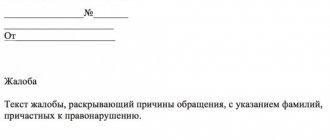Nowadays, situations often occur when teachers do not behave like teachers, allowing themselves to behave rudely and aggressively towards students. Sometimes one or another teacher even makes insults that humiliate the honor and dignity of students. How to complain about a teacher in such cases? The answers are in our material.
IMPORTANT : our lawyer will help you draw up a complaint within 24 hours: professionally and on favorable terms. Call today!!!
When to complain
Possible reasons for complaints against a teacher include:
- failure to fulfill professional obligations (failure to attend lectures, seminars, teaching outdated material, etc.)
- biased attitude/inflated demands that differ from those imposed on other students;
- coercion to perform certain actions (attend additional classes, events, excursions);
- insult, humiliation, discrimination;
- demand for money (for admission to exams, obtaining certain grades), etc.
Both one student and several people from a certain group or faculty have the right to complain about a violation of interests. In the latter case, the appeal will be collective, which is considered a more effective way to solve the problem.
Application form
A complaint is recognized as an official document, which entails the emergence of certain rights and obligations. Therefore, when compiling it, you should adhere to the following rules of business communication and correspondence:
- compose your requirements correctly and without errors;
- It is unacceptable to use obscene and slang words, as well as insults directed at anyone;
- describe the situation as accurately as possible, but at the same time succinctly;
- words and expressions with a “double” meaning should not be used;
- all data must be reliable (dates, numbers, numbers, addresses, etc.);
Make sure your speech is correct, follow the rules of syntax and punctuation. Competent speech is one of the most important conditions when conducting business correspondence.
There is no rigid form for such statements. Since such cases are not so frequent, the director most likely does not have any special forms. Such a statement is written as follows. In the upper right corner, indicate to whom you are submitting the application - the position, surname and initials of the addressee. The name of the educational institution should be indicated as in the registration documents.
Just below, indicate who this application is from - your last name, first name, patronymic in the genitive case, as well as address and telephone number. If you are writing a statement on behalf of all parents, write “from the parents of students of such and such class.” Give your contact phone number and indicate whose number this is. Stepping back a few centimeters, write the word “statement” in the middle of the sheet, and below it – the actual text.
It may look like this: “We, the parents of 6th grade students, ask to replace the history teacher for such and such reasons.” Next, tell us about the facts that prompted you to draw up such a document. Do not forget to indicate the essence of the conflict, the date and names of the participants. If the parents' dissatisfaction was due to lack of competence, indicate on what basis you came to this conclusion.
Where to complain
A complaint against a teacher can be sent to the following authorities:
- Management of the educational institution.
- Department of Education (local and regional).
- Ministry of Science and Higher Education (Ministry of Education and Science).
- Federal Service for Supervision in Education and Science of the Russian Federation (Rosobrandzor).
- Prosecutor's office, law enforcement agencies, court.
Management of the educational institution
You can send a complaint to the head of the department, dean, or rector of the university. The easiest way would be to bring it personally to the secretary, but you can also send it by registered mail with notification. In the first case, the document should be prepared in two copies: one should be handed to the secretary, and on the second you should receive a receipt stamp with the number of incoming correspondence.
In the complaint, it is recommended to request a response in writing, so that in case of an unsatisfactory result of the review, a copy of it can be sent for appeal to higher authorities.
If the problem concerns bribery, the university management does not have the right to make any decisions. The rector, as an official, is obliged to transfer information about a possible violation to the prosecutor's office, whose employees will establish the fact of a violation of the law.
Department of Education
If the university management has not responded properly to the complaint, you should contact the Department of Education. The structure is represented at the local and regional levels. At the first stage, control functions in the educational sphere are assigned to a committee (department) of the local administration, where complaints should first of all be filed for more prompt consideration. If the result of the review is unsatisfactory, you should contact the Department of Education for the subject.
The complaint should be accompanied by a copy of the previously sent appeal to the local committee and the response received (if any).
On the territory of Moscow, the Department of Education and Science is responsible for the functioning of the education system (including higher education) in the interests of citizens. Contacts:
- Address for letters: 129090, Moscow, st. Bolshaya Spasskaya, 15, building 1.
- Public reception address: st. Academician Tupolev Embankment, 15, bldg. 4.
- Hotline number.
- Electronic reception on the website of the Moscow Government: https://www.mos.ru/feedback/reception/ (pre-select the appropriate Department as the recipient).
Information about registering requests is provided by calling +7 (495) 366-66-80.
Ministry of Education
You should complain to the Ministry of Science and Higher Education of the Russian Federation only after the problem has not been resolved by contacting other authorities. Otherwise, the document will be forwarded for consideration to lower authorities in the field of education management. You can complain in one of the following ways:
- By registered mail to the address: 125009, Moscow, st. Tverskaya, 11.
- Call the hotline: 8-800-222-55-71 (for calls from 9:00 to 17:00 Moscow time).
- Via electronic application form: https://minobrnauki.gov.ru/ru/reception/appealnew/
If the reliability of the information reflected in the appeal is established, a decision is made to bring the teacher to administrative responsibility or transfer the materials to the prosecutor's office.
Rosobrnadzor
The competence of Rosobrnadzor includes supervision and control of the country's educational institutions, identification and elimination of violations in the field of education. In addition, here you can complain about the unsatisfactory work of another department in the field of education (for example, if previously sent requests are ignored). You can do this:
- by letter to the address: 127994, Moscow, Sadovaya-Sukharevskaya st., 16, K-51, GSP-4;
- at a personal reception (the schedule can be found on the tab of the same name at the link https://obrnadzor.gov.ru/ru/open_government/statements/processing_applications/index.php);
- through the electronic reception: https://obrnadzor.gov.ru/ru/open_government/reception/
Prosecutor's office, police, court
The use of physical force, extortion of money for the opportunity to pass exams, coursework, or violation of other articles of the Criminal Code of the Russian Federation are direct grounds for contacting the prosecutor’s office or the police (you can contact both authorities at once). You can also complain to the prosecutor's office if your appeal is ignored by other authorities or the time frame for their consideration is delayed.
The competence of the prosecutor's office does not include decisions regarding the educational process (low qualifications of teaching staff, submission of outdated material), therefore such appeals should be sent only to the relevant authorities.
If you need compensation for moral damage, harm to health, or damage to things as a result of the actions of a teacher, you must go to court. The claim must be accompanied by evidence confirming the validity of the claim for compensation (for example, extracts from a medical card, receipts for payment for medical services, etc.).
OUR SURVEY
What to do if a teacher grossly violates the rules of teaching? What should be the order of your actions?
Is it necessary to write a complaint to the rector, to the dean’s office or somewhere else if your rights are OBVIOUSLY, and not only that, being infringed?! Thousands of students and even schoolchildren have such questions! You should never forget that the teacher receives a salary for teaching, which includes your tuition fees, as well as all kinds of “sponsorship” fees.
We do not recommend immediately launching an attack with all kinds of complaints and statements. Try to resolve the issue peacefully first. Namely: after class, come up and politely make a remark. If it doesn’t help, talk to your boss. Only reasoned and without emotions. University teachers often sin with their powers, because students most often cannot oppose anything - the teacher’s injustice still needs to be proven, the dean’s office is most often on the side of his colleague.
So, if you can’t sort it out verbally, write a complaint. And do it right.
Below are instructions with a sample of writing a complaint against a teacher.
.
After reading the instructions for filing a complaint and seeing, in fact, the sample complaint against a teacher
, you will understand that resolving any controversial issue in your favor is NOT A PROBLEM.
1) You must write a complaint to the administration of your educational institution, where you must clearly, without unnecessary emotions, describe that such and such a teacher does not treat you as he should, namely: shows disrespect, unreasonable harshness, offensive statements, etc. Okay, if witnesses (other students) sign on this complaint. 2) This complaint is submitted to management, bring it yourself or through your representative who carries out communication. The secretary must confirm that your complaint has been accepted and will be considered within a certain time frame. Namely: the secretary must put a stamp on one of the copies of the complaint, and also provide the incoming number. You can send a complaint by registered mail. 3) Further, if the leadership is normal, then it will take steps to ensure that this chaos ends. Unfortunately, very often the leadership in institutions is such that they will not take any steps. In this case, you can relieve your soul by writing your complaint to the blacklists of institutes on special forums. In this way, the teacher will punish himself.
There is another option - or try to cope on your own by preparing some caustic phrases in response to him (the teacher), which you will say in the audience in front of everyone as a joke. Like, “Why does my person give you so much peace? Are you not in love with me?” and smile sweetly.
Or “How about we focus on the subject matter for a change and not my humble personality?” Or something more offensive...
But if you still decide to write a complaint to the dean, here is a sample:
.
Do not forget that the complaint is printed in two(!) copies, one of which remains with you with a stamp of acceptance. It is better to always request a response to complaints in writing, so that in case you are not satisfied with this response, you can complain further to a higher authority.
.
Sample complaint
There is no single template for filing complaints, so the document can be written by hand or typed on a computer. The second option is preferable because it will be more readable for the recipient. It is important:
- Indicate in the header information about the addressee (full name of the official or name of the institution) and the sender (full name, address, telephone).
- State the circumstances/illegal actions that gave rise to the appeal. You should also indicate the dates of violations (if they are systematic), information about students whose interests were violated, and measures taken independently to resolve the conflict (for example, attempts to talk with the teacher).
- Provide materials proving guilt (if available).
- Indicate the desired actions towards the teacher (apologize, correct the mistake, return the money, bring disciplinary action, etc.).
- Insert the date of preparation of the document and signature with a transcript.
You should not use profanity, threats, insults, or false information in the text. It is necessary to adhere to a business style of presentation and avoid overly emotional expressions.
What measures can be taken?
Preventive measures against a teacher are taken on the basis of the laws of the Russian Federation and the contractual obligations of teachers to the management of the university. In case of proven unprofessional performance of duties, negligence, or offensive behavior towards a student, the teacher may be subject to disciplinary action, suspended from the educational process or dismissed .
If the teacher’s actions were illegal, a preventive measure is prescribed by the judicial authorities on the basis of the legislation of the Russian Federation. If illegal actions of a teacher against a student are proven, punishment can range from a fine to imprisonment.
Question answer
Question: The teacher does not fulfill his duties. The dean's office and the rector do not respond to complaints, citing the fact that he is the only specialist in his field. Where else to complain?
Answer: Contact the Department of Education on the basis of Art. 89 Federal Law “On Education”.
Question: At my university there is a teacher who is constantly late, even for tests and exams. On different days, the delay ranged from 30 minutes to 1.5 hours. Where can I complain?
Answer: You should start with a collective complaint addressed to the dean of the faculty, and if there is no desired result, contact the rector and other authorities.
Question: My daughter often complains about insults and boorish attitude from one of the teachers, but she is afraid to record audio or video material for evidence. By the way, everything is fine in other subjects, the performance rating is the highest in the group. How to complain?
Answer: If the daughter is an adult, she must file a complaint on her own. The document is drawn up in simple written form addressed to the dean or rector.
Question: The teacher constantly finds fault with any words, he has already brought me to tears several times. Only classmates present in class can confirm. Can I use their words as evidence? How to register them? Where to complain?
Answer: File a complaint with the rector of the university and the Prosecutor's Office. You can present written evidence in the text. Be sure to “remind” the existence of Art. 336 of the Labor Code of the Russian Federation, which defines additional grounds for termination of an employment contract with a teacher. One of these is the use of educational methods associated with physical or mental violence against an individual.
Question: Is it possible to file a complaint against a teacher anonymously?
Answer: Anonymous complaints in most cases remain unconsidered. Employees of the authorized body are required to send a response to the received request to the sender, but in this case there is no response. But exceptions and additional checks are possible if the appeal involves serious offenses.
Question: The teacher demands (not only me) to pay for his master class for 4,000 rubles, otherwise he threatens to be denied access to the state. How can you prove that this is a demand for a bribe? Where to complain?
Answer: Contact the district prosecutor's office. If the appeal is collective and not individual, you can count on a faster response.
What to do if there is no reaction?
If an individual complaint is rejected, it can be resubmitted. There are no restrictions on the number of complaints. You can also create a collective petition.
As a rule, collective statements are given more attention.
A written appeal received by a government body or official must be considered within 30 days from the date of registration . If the deadline for considering a complaint is extended, the victim must be notified in writing.
If there is no response to the complaint, you need to write to a higher authority or contact a lawyer for professional advice.









